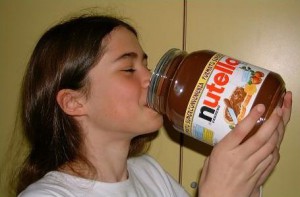Breaking News: Nutella is Not Health Food
In case you’re one of the unfortunate souls who has never tasted or (gasp!) heard of Nutella, I’m going to give you a minute to go to the nearest grocery store, buy some, and taste it. Go ahead. I’ll be here when you get back.
***
Delicious, isn’t it? Now, I understand that some people don’t like Nutella. They suffer from an unfortunate condition that psychiatrists refer to as “being wrong.” I can only imagine that it was one of those wrong people who brought this lawsuit (also reported here – requires registration, and here).
 I’ll get serious now. A lawsuit, filed in a federal court in San Diego, alleges that the maker of Nutella engaged in false advertising, because it allegedly suggested that its product is a nutritious, balanced breakfast for children. Now, as delicious as Nutella is, I don’t think anybody would mistake it for a weight loss product. It is approximately 70% saturated fat and sugar, by weight. It’s definitely something to be enjoyed in moderation.
I’ll get serious now. A lawsuit, filed in a federal court in San Diego, alleges that the maker of Nutella engaged in false advertising, because it allegedly suggested that its product is a nutritious, balanced breakfast for children. Now, as delicious as Nutella is, I don’t think anybody would mistake it for a weight loss product. It is approximately 70% saturated fat and sugar, by weight. It’s definitely something to be enjoyed in moderation.
Looking at the label on a Nutella container, I don’t see anything implying that the stuff is diet food. Nonetheless, the lawsuit alleges that the named plaintiff in this class action bought the product after seeing a commercial that depicted mothers serving it to their children for breakfast, and declaring it to be healthy and nutritious.
She claims to have been “shocked” (SHOCKED!) when she found out that Nutella is not particularly healthy. I guess seeing the creamy chocolate goodness when she opened the jar didn’t clue her in.
This blog recently discussed a story concerning Taco Bell, and a lawsuit claiming that they shouldn’t call their taco filling “beef” because it’s allegedly less than 50% beef by weight. Now, if that turns out to be true, a case can be made that calling the product “beef” or “meat” without any qualifiers might be slightly misleading.
But simply showing people eating your product (the intended use of the product), as the offending Nutella commercials do, doesn’t seem like it could be in any way construed as a nutritional claim. If they had made commercials saying Nutella will help you lose weight, cure baldness, treat cancer, or that it can be molded into a working artificial heart, there might be a case for false advertising.
So, this individual case looks like it’s probably not going to go anywhere.
One silly case shouldn’t give the impression that false advertising isn’t a real thing that can cause real harm, however. As with any form of fraud, false advertising can cost its victims huge amounts of money, and can sometimes endanger their health, especially when a worthless or dangerous product is advertised as a medication or dietary supplement. Any statement in advertisement which is false, deceptive, or misleading can be grounds for a false advertising claim. It doesn’t matter if the victim was actually harmed, nor does it matter if the falsehood was deliberate.
This is a very strict standard – even a false claim that was included in an advertisement unintentionally, and causes nobody any harm, is illegal. And, generally, I think rules like this exist for a very good reason. If some advertisers were left to their own devices, it’s certain that they would mislead consumers. And if falsehoods that don’t directly harm the consumer, or which are accidental, aren’t illegal, some unscrupulous advertisers would be constantly pushing the envelope.
An absolute blanket prohibition for any and all false statements of fact in advertisements (leaving room for subjective statements of opinion, and “sales puffing”), encourages advertisers to scrupulously vet every factual claim made in an advertisement, since even accidental falsehoods are actionable.
This should, in theory, greatly reduce the number of instances of false advertising in the first place, making valid lawsuits for false advertising fairly rare.
On another note, the plaintiff in this case apparently declined to take advantage of another hard-won consumer protection: nutrition and ingredient labels on food. Look at every single packaged food product sold in stores. Notice the ingredient and nutrition information printed somewhere on the label? Do you think the makers of fried pork rinds put accurate nutritional information on their packages out of the kindness of their hearts? I didn’t think so. The FDA mandates that certain nutritional information be placed on the labels of packaged food. Nutella is presumably no exception. While compliance with labeling laws is no excuse for false advertising (if it did actually occur in this case), it does case some suspicion on the mother’s claim that she was “shocked” to learn that Nutella wasn’t healthy.
On the other hand, if Nutella did produce an advertisement suggesting that it had health benefits, or even indirectly suggesting that it wasn’t mostly sugar and fat, this plaintiff might have a case. And while I agree that litigation is probably the best way to redress serious violations of one’s legal rights, it should not be the first option you think of when you have a problem.
What our clients think
At LegalMatch, we value our client’s opinion and make it a point to address their concerns. You can refer to our reviews page if you want to know what our clients have to say about us.


Comments